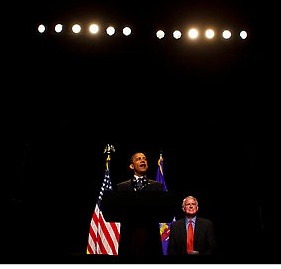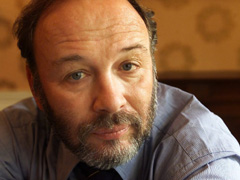On Thursday’s American Morning, CNN’s Deborah Feyerick continued her network’s promotion of the charge the “Islamophobia” is growing in the U.S. All but one of Feyerick’s sound bites during her one-sided report were from those who agree with this charge, with the sole exception being used an example of someone using ” Islam …[as] a political wedge issue .” Anchor Kiran Chetry and substitute anchor Ali Velshi introduced the correspondent’s report just before the bottom of the 7 am Eastern hour. Chetry stated that “attempted terror attacks aimed at the U.S. have come mostly from Muslim extremists born outside of America” and then claimed that “America’s Muslim community though has been quick to warn law enforcement about these potential threats.” Velshi added that “the question is, why does it appear that more and more that all Muslims are being portrayed as potential terrorists or as targets of hate .” Feyerick began by citing unnamed ” experts will tell you that there’s a great deal of misunderstanding when it comes to what Islam is all about. Add on politicians spreading rumors that Sharia law – Islamic law- is coming to the United States simply because a group of Americans wants to build a mosque . It’s time to ask, what’s really going on?” She then noted that the “Islamic center and mosque to be built near Ground Zero is not the only mosque drawing fire. About a dozen others across the country are also under attack, from angry protests and suspected arson in Murfreesboro, Tennessee to Temecula, California . American mosques, in some cases, [are] being portrayed as monuments to terror or terror training centers.” The CNN correspondent continued with a series of sound bites from those who allege a growing and threatening “Islamophobia,” and singled out conservatives for apparently persecuting Muslims: FEYERICK: Conservatively, figures show an estimated five million Muslims in America, and intensifying hostility and rise in hate speech is alarming to many, like these clerics who we met at a recent Islamic summit in Houston . YASIR QADHI, ALMAGHRIB INSTITUTE: You would never hear any mainstream commentator say, do you think another Christian sect could open up a mosque? Do you think Jews should be allowed to open their synagogues anywhere they want? We have mainstream news presenters just asking the question bluntly, do you think Muslims should open- should be allowed to open mosques anywhere they want? WISAM SHARIEFF, BAYYINAH INSTITUTE: What changed the game? Nineteen people changed the game? How did that happen? Because we’ve been your doctor, we’ve been your x-ray tech, your accountant. We’ve been serving you slushies for a long time. (unidentified man off-camera laughs) So, what tipped the scales? FEYERICK: Wisam Sharieff, Yasir Qadhi, and other prominent American clerics say American Muslims are under siege, both by Islamic extremists and some U.S. conservatives . QADHI: You have radical Islamic clerics, right, preaching from abroad, saying you cannot be an American and a Muslim at the same time. Well, low and behold, on the far right, you have quite a number of famous, prominent Islamophobes who are saying the exact same message. FEYERICK: The Ground Zero mosque, as some call it, has whipped up national debate, fueled, in part, by misinformation and fear-mongering. Yet, anti-Muslim feelings had been simmering. Feyerick’s example of a “famous prominent Islamophobe,” to use Mr. Qadhi’s term, was none other than former House Speaker Newt Gingrich. Before playing her sound bite of Gingrich, she used her “wedge issue” label, and afterwards, went on to cite other unnamed “experts” and highlight an apparent “hate crime” against a Muslim: FEYERICK: Islam has become a political wedge issue with politicians like Newt Gingrich comparing Muslims to Nazis . NEWT GINGRICH: You know, Nazis don’t have the right to put up a sign next to the Holocaust Museum in Washington. There’s no reason for us to accept a mosque next to the World Trade Center. FEYERICK: In fact, a Duke University study finds, rather than fuel terrorism in America, contemporary mosques prevent it. National security experts and American Muslims, like Saraj Mohammed, fear there’s a lot at stake . SARAJ MOHAMMED: The more they speak and the more they incite people, they themselves are a concern to be dealt with and they have to be told, you have to stop this rhetoric. It’s hurting American security. FEYERICK (on-camera): Right. Because it’s creating hatred? MOHAMMED: Yes, it’s creating a lot of hatred. FEYERICK: The latest 2008 FBI statistics on hate crimes against Muslims don’t reflect what’s going on now. But experts believe the spike that happened after 9/11 could repeat itself . FEYRICK (voice-over): In New York recently, a cab driver was stabbed after his attacker allegedly asked if he was Muslim. QADHI: Slowly but surely, we will counter this Islamophobia. Everybody had it. The Irish had it. The Catholics had it. The Italians had it. Now, it’s just time for the Muslims. FEYERICK: (“Allah ackbar” being chanted in an unidentified location) How long it will take to counter is anyone’s guess. At the end of the segment, the CNN correspondent, along with Chetry and Velshi, forwarded the claim that the Islamic cleric behind the Ground Zero mosque, Imam Faisal Rauf, was a “moderate” and bewailed what might happen if other “mainstream” Muslims were rejected by Americans: FEYERICK (live): Imam Faisal Abdul Rauf, the one who is at the head of the so-called Ground Zero mosque , will return to New York City sometime today. He’s been serving as an emissary for the U.S. State Department, reaching out to leaders in the Middle East, acting as a bridge between the U.S. and Muslim countries . He says, just as American Catholics were crucial in pushing reform in Vatican II, so will American Muslims be indispensable in bridging the chasm between America and the world’s 1.2 billion Muslims. So, there’s a real danger that alienating or marginalizing Western moderate mainstream thinkers is going to be a problem, simply because of religion . VELSHI: It’s a big issue. I know Imam Faisal, as you do- you’d be hard pressed to ever be able to describe him as radical, or a radical thinker. He believes he’s building a bridge between different faiths, but when this label is applied, it gets applied and it sticks . FEYERICK: Well, absolutely- and you have people simply asking questions with no fundamental proof as to what they’re saying. It’s one thing to say, let’s find out where the money is coming from. Well, I can say that. But it doesn’t mean – VELSHI: Right- FEYERICK: That it’s coming from somewhere insidious. But that’s what the allegation- that’s what the insinuation is . So there’s a real, sort of- VELSHI: That’s right. It’s buried in the insinuation . FEYERICK: Yeah. CHETRY: And I know that you’re hoping to get chance to sit down and talk to him one-on-one, correct? FEYERICK: Absolutely. We spoke to the developer, who couldn’t have been more honest about what this is about, and we’re hoping to get a chance to speak to him as well . CHETRY: Good stuff. VELSHI: Thanks for your great coverage on this. Thanks, Deb. Exactly a week earlier, on August 26, Feyerick joined the mainstream media’s guessing game over the aforementioned stabbing of the Muslim taxicab driver, advancing the hypothesis that it may have been ” connected to this big Ground Zero controversy, where we’re hearing so much anti-Muslim sentiment .” Who would have thought that a mere six weeks or so earlier, the correspondent actually played hardball with the real estate developer behind the New York City mosque, Sharif el-Gamel.

Read this article:
CNN Continues One-Sided Reporting on ‘Islamophobia’ in America



























